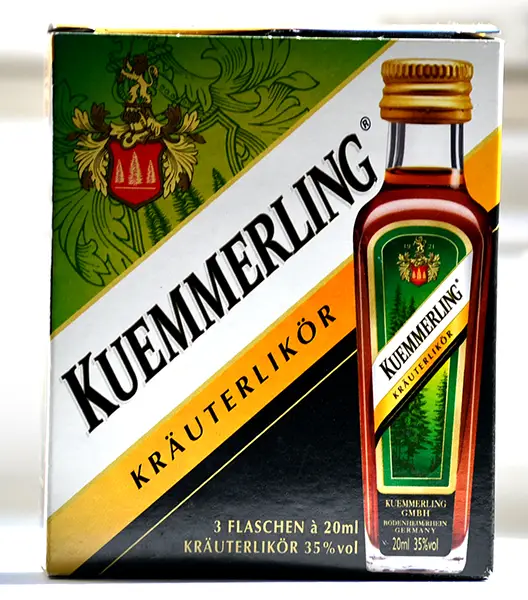It was a snowy late November night in the eastern part of Germany, in a town of Weimar, and my study abroad professors decided to treat my classmates and I to a traditional German dinner in celebration of Thanksgiving back home.
The meal consisted of five courses: Schmaltz (chicken fat to use as a spread on bread), a hearty beef stew, roasted pork on a bone, a whole chicken leg with a side of potato dumplings, and dessert. The calorie and fat-rich dishes with a few beers in between made for a very heavy dinner, and by the time the chicken was brought in front of me, I no longer wanted to eat or drink.
That’s when I was given a little shot bottle with a liqueur that had “herbs” written on its label. When I politely refused the alcoholic drink, I was told:
“This isn’t an offer. You have to drink it. It’s for your health.”
“Excuse me?”
Indeed all of us was given the little bottle twice, in between the main meat dishes. And considering I must have ate and drank more than 2000 calories over the course of a 4-hour dinner, I found it remarkable that the food hangover was almost unnoticeable, and the food did not make me as tired as I expected.
So what did I drink?
Kräuterlikör, and there are a few brands that make different varieties of it, is a half-bitter, made with numerous medicinal and culinary herbs and spices. A bitters is an alcohol-based tincture of an herb that tastes bitter as a finished product and is used medicinally to aid digestion. The liqueur is a half-bitter because of its high sugar content. Kräuterlikör is also considered a digestif, popular in Germany since the medieval times – an alcoholic beverage that is drunk before or after eating to promote digestion.
 Label: Serve chilled. Some of the herbs are: angelica root, clove, guaiac, calamus, mint, licorice, wormwood, cinnamon. Kuemmerling has always been produced according to a secret recipe. The combination of the chosen valuable herbs gives Kuemmerling its distinctive flavor.
Label: Serve chilled. Some of the herbs are: angelica root, clove, guaiac, calamus, mint, licorice, wormwood, cinnamon. Kuemmerling has always been produced according to a secret recipe. The combination of the chosen valuable herbs gives Kuemmerling its distinctive flavor.
Out of the herbs that are listed on the package, many are indeed used in traditional medicine and lately in researched clinical studies as a digestive aid.
Angelica root: Swedish University of Agricultural Sciences listed three of the many uses of angelica to be for digestive troubles, as a guard against constipation, and to promote appetite. Angelica also showed to be good for the liver.
Clove: Syzygium aromaticum is beneficial for diarrhea, intestinal gas, nausea and bloating, as well as general digestive health, according to Optimal Digestive Health: A Complete Guide by Trent W. Nichols and Nancy Faass. It is noted that this plant is also very popular in India and in Chinese Medicine.
Calamus: Not a well-known Western herb, this plant has been used as a digestif in Europe for centuries. Originally found in Asia, it has traveled across the world and only now is starting to be used in the United States. Besides the traditional use of improving digestion, it is now being also used in clinical herbalism for neurological problems.
Mint: Mint is the most well-known herb from this list, and has been gaining popularity in the U.S. as a tea to calm down an upset stomach and relive nausea.
Licorice: The Huffington Post has reported on integrative medicine doctors using licorice to treat many gastrointestinal issues.
Wormwood: Wormwood has compounds that improve digestion and help guard against and cleanse from harmful organisms.
Cinnamon: Cinnamon’s anti-bacterial properties help guard from upset stomach, and also help speed up digestion. Currently, the scientists believe it works by increasing digestive enzymes, according to LiveStrong.com.
 Other companies are protecting their secret ingredients as well. Jägermeister is the famous herbal drink has a known list of 16 ingredients and another 50 are secret. And Underberg, first created in 1846, has a ”heavily guarded” recipe, according to the Huffington Post.
Other companies are protecting their secret ingredients as well. Jägermeister is the famous herbal drink has a known list of 16 ingredients and another 50 are secret. And Underberg, first created in 1846, has a ”heavily guarded” recipe, according to the Huffington Post.
Like most alcoholic beverages, the herbal shots such as Jägermeister have been abused at college parties and clubs. That was never the product’s true intention, as it has even been originally marketed as digestive remedy. Herbs are helpful as medicine and have been researched for centuries, particularly in Europe; and Germany has been using herbs as a part of the primary healthcare for years. Because herbs are medicinal, they are also extremely powerful, and with 8 to 16 known herbs used in herbal liqueur, they require respect.
Skip the herbal liqueur at parties, but try it before or after your next holiday dinner and find out for yourself if it is beneficial to you.
Where to Find German Digestive Aids
These products are hard to find in the U.S., although they may be available at select ethnic, liquor or health food stores with a little luck.
You can also buy them online — Amazon.com sells German digestive aids from the brand Underberg in various sizes and amounts.
Thus far the reviews are overwhelmingly positive with over 80% of 120 customer reviews in the five-star range and people commenting that it works well for helping them digest large meals. If you do get a chance to try them, let us know what you think in the comments section below.
Thanks for installing the Bottom of every post plugin by Corey Salzano. Contact me if you need custom WordPress plugins or website design.





